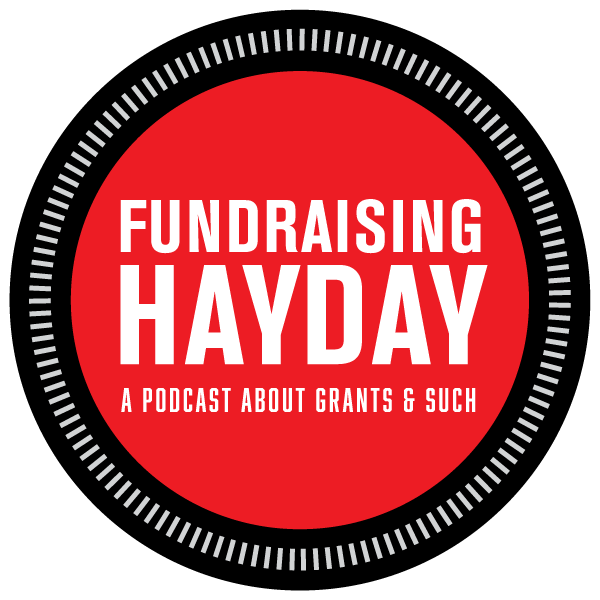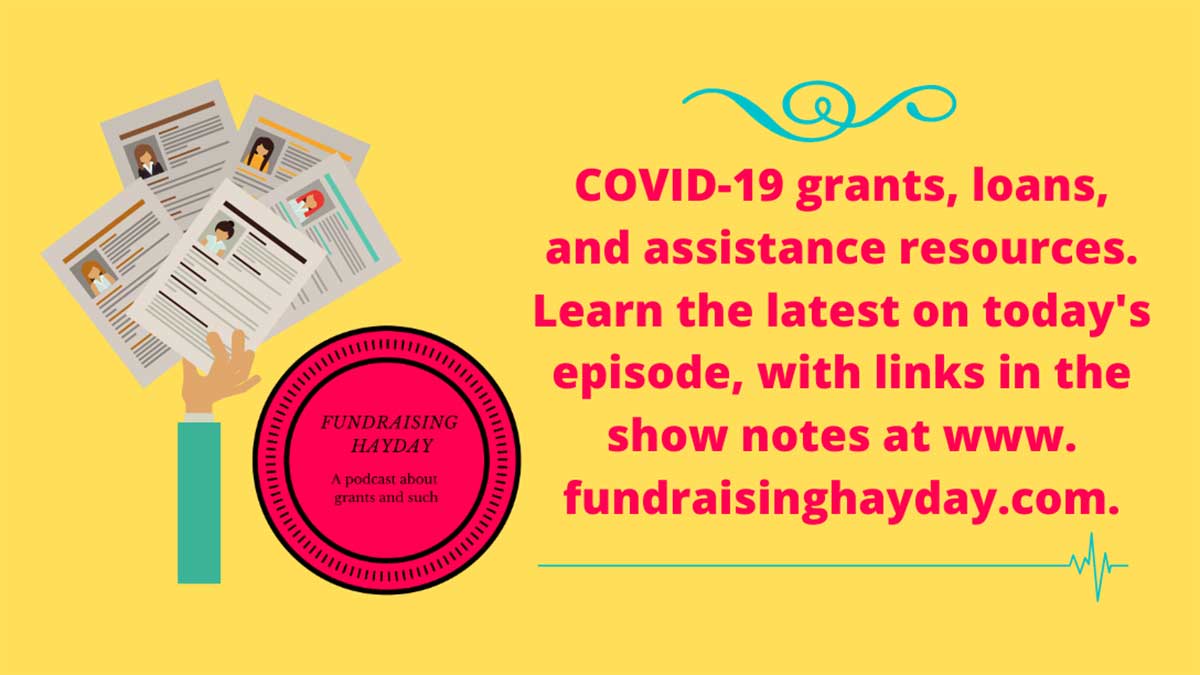SHOW NOTES
Community Foundation Public Issues Initiative – to date, $238.7 million response from 170 foundations across the country. You can find their blog with specific COVID-19 response funding here.
National Council of Nonprofits – sharing breaking analysis of federal relief being finalized and what it means right now.
The Coronavirus Aid, Relief, and Economic Security (CARES Act), Senate Bill 748 – provides significant funding for businesses, hospitals, schools, and social support programs, among many other things; based on initial analysis of 1,000 page bill (knowing that things may change because the bill has not been made into law yet); you can follow the bill’s progress here. You can read the current bill in PDF form here. The bill includes the following provisions (as it stands at this publication date):
- Emergency Small Business Loans – provides funding for special emergency loans of up to $10 million for eligible nonprofits and small businesses; potential for loan forgiveness if certain requirements are met
- Economic Injury Disaster Loans – eliminates creditworthiness requirements and appropriates an additional $10 million to the program so eligible nonprofits a can bet checks for $10,000 within three days
- Self-Funded Nonprofits and Unemployment – only reimburses self-funded nonprofits for half the costs of benefits provided to their laid off employees; this blog article explains more.
- Charitable Giving Incentive – includes an above-the-line deduction for total charitable contributions of up to $300
- Employee Retention Payroll Tax Credit – creates a refundable payroll tax credit of up to $5,000 for each employee on the payroll when certain conditions are met. NOTE: employers receiving emergency small business association loans will not be eligible for these credits.
- Industry Stabilization Fund – sets aside $425 billion for “eligible business”; nonprofits may qualify for these
- Direct Payments – provides $1,200 or less to adults and $500 per child ($3,400 for a family of four) to be sent out in weeks; the amount of the payments phases out based on earnings of between $75,000 and $99,000 ($150,000 and $198,000 for couples)
- Expanded Unemployment Insurance – includes coverage for workers who are furloughed, gig workers, and freelances; increases payments by $600 per week for four months on top of what state unemployment programs pay
- Amendments to the New Paid Leave Mandate – lowers the amounts that employers must pay for paid sick and family leave under the Families First Coronavirus Respond Act (enacted March 19) to the amounts covered by the refundable payroll tax credit – i.e., $511 per day for employee sick leave or $200 per day for family leave
Families First Coronavirus Response Act and Nonprofits, House Resolution 6201 – this bill provides paid sick leave, tax credits, expands food assistance, and other needed assistance. You can read a PDF version of the approved bill here. Assistance within the bill includes:
- Employment Provisions – imposes new job protections for workers, paid leave mandates on employers, and a generous reimbursement scheme for employers; law provides two weeks of paid sick leave, a subsequent ten weeks of partially paid family leave for the care of a child, and refundable tax credits.
- Supplement Nutrition Assistance Program (SNAP) – authorizes states to request a waiver for temporary, emergency SNAP benefits to existing beneficiaries up to the maximum monthly allotment. All work and training requirements for SNAP benefits are suspended during the crisis.
- Child and Senior Food Nutrition – a combined $900 million appropriated for the Special Supplement Nutrition Program for Women, Infants, and Children (WIC) and the Emergency Food Assistance Program (TEFAP) to assist local food banks to purchase food, including costs for storage and distribution. Legislation also authorizes the Department of Agriculture to approve state plans for emergency Electronic Benefit Transfer (EBT) food assistance for households with children who receive free or reduced school meals if their school is closed for at least five consecutive days. An additional $250 million is provided for the Senior Nutrition program for 25 million home-delivered and pre-packaged meals to low-income seniors.
Coronavirus Preparedness and Response Supplemental Appropriations Act, H.R. 6074 – this bill provides $8.3 billion in emergency funding for federal agencies to respond to the coronavirus outbreak. You can view a PDF of the bill here. The bill includes:
- $20 million for Small Business Association Disaster Loans Program Account – funding available until expended
- $2.2 billion for Centers Disease Control activities and support; of this, not less than $950 million shall be provided in the form of grants and cooperative agreements to states, localities, territories, tribal nations, and other entities to carry out surveillance, epidemiology, laboratory capacity, infection control, mitigation, communications, and other preparedness and response activities; $475 million of these funds shall be made available 30 days of the Act’s enactment; also, every grantee that received a Public Health Emergency Preparedness grant for FY19 shall receive not less than 90 percent of that grant level from funds in this act; health agencies have 45 days from Act’s amendment to provide their spending plan to the CDC
- Public Health and Social Services Emergency Fund – $100 million shall be transferred to “Health Resources and Services Administration – Primary Health Care” for grants under the Health Centers Program as defined by section 330 of the Public Health Service Act, to prevent, prepare for, and respond to coronavirus
Grants.gov – you can use this federal database to search for COVID-19 funding. You may find a few grant opportunities, but more likely you will find information related to other grant deadlines being extended due to the virus. One grant found through this search method was the Hospital Associations COVID-19 Preparedness and Response Activities from Health and Human Services, providing $50 million to the 53 hospital associations.
You can visit each federal department’s website to find what grants and/or resources they are sharing. Examples found include:
Data – Both federal and state websites share data on the number of people tested, number of confirmed cases, and number of deaths; many times this data is broken down by county (when you visit your state’s health department or emergency management websites), age, and gender; examples of where you can find such data include:




